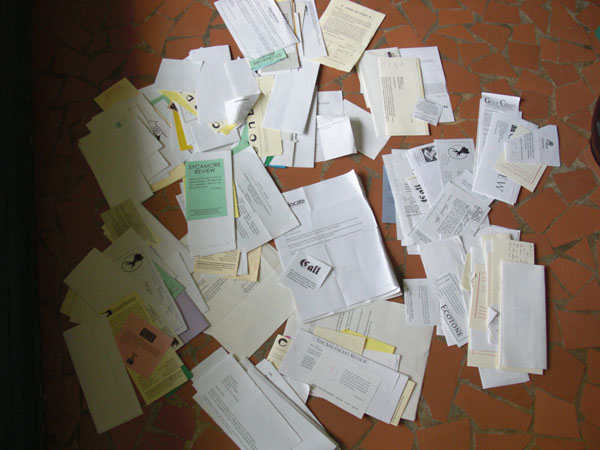A (a dude, in midst of an actual conversation): Wait, Deb Olin Unferth isn’t famous.
C (another dude): She’s not? Of course she is. She’s famous.
A: Famous why? Because she had a book out with McSweeney’s and was in Harper’s?
C: People know who she is.
A: Writers know who she is. That’s not famous.
C: Famous, fine. She’s a buzzball. People talk about her. She’s famous enough.
B (a jew dude): Nobody is famous unless my grandmother knows who it is.
C: So are there any famous writers?
B: Philip Roth.
Remember Alone?
Writers:
Remember what it is to be alone?
Fifteen interviews after XXXX gets his book published by XXXXX XXXX Press. Constant promo. Constant talk. Talk about the work. ‘What brought this book out?’ ‘What were you thinking here?’
Use of words: Great, Beautiful, Amazing, Stunning, Remarkable.
After an hour of thought, I’d say that I’ve read two books that I would consider great in my proportion. Two books. I know it’s nice to be nice. That’s okay. But, please, as an excuse, do not use the ‘it’s tough to be a writer.’ No. It may feel tough, but it is not. Look around you.
To sum: I think that within the internet, writers can easily grab hold of a lot of pages and capitalize and gather attention.
Remind yourself: This is a psychic burden, this page. Is it worth it? Is it worth it for me and for the audience?
It is okay to be alone.
Have you ever said no to an interview? You can! You can, actually. It can be worth the gamble of pissing off the proposer. You don’t even need to tell them that it is because of you, because of your want to sit quietly and think, and work. Talk can be poison.
It’s a mistake for a sculptor or a painter to write or speak very often about his job. It releases tension needed for his work. –Henry Moore
It’s easy to feel the frenetic prompts that the internet–and within it the communities–create. Resist them. Action for action is not action at all. It is movement. (Marketing is often the endgame for this movement; you create burden. Burden. Think about what you want to play, what you want to ask. What you want to give. Think long term. Ten moves in chess deep long term. Anything less than that is lazy.)
Resist the movement. Revolution, now, is a withdrawal.
Remeber what it is to write. Remember the seed?
The seed is you. Alone.
This is, as it must be, as much for me as it is for XXXX. For you. For me. One in the same here.
Lit Mags as an Empty Mob Scene & yes I know this is an oink

If there’s anything the majority of the community of literary magazines suffers from, it is a lack of imagination: a whole-on blanket of blanking in the way of actual attention demanding, which is very likely a large part of the reason why many of these magazines, and the book industry as a whole, often, doesn’t spread. Blank. Noise for noise’s sake. Tribunals and routine.
Youtube teaches me something about writing.
Let’s talk about flat affect in a writer’s tone. But first, let’s watch Beyonce:
httpv://www.youtube.com/watch?v=8mVEGfH4s5g
READ MORE >
Man, I sure am loving Mean Week!
happiness hat from Lauren McCarthy on Vimeo.
How about you?
“Let’s talk about something important”
My first year at Bennington, the first thing we did at orientation in a dark room full of the whole student body and faculty was watch the Alec Baldwin monologue from Glengarry Glen Ross. We watched it with little to no introduction from the then head of the program, Liam Rector, who has since taken his own life. Liam played the clip at least every other semester for the new students, sometimes mentioning that it was the only thing they needed to get out of the program, and sometimes just sitting down and grinning wildly at the screen. A lot of people didn’t seem to understand what Liam wanted us to watch this scene for. A lot of them just shrugged it off and kept asking when the panels on publishing would be. You may or may not have seen this bit before, but thinking of it in context of the opening to an MFA program to me seems pretty right on both as in the mind of business and of art, if “mean” in a totally constructive and let’s-save-you-and-me-some-time kind of way. So, for Liam…
criticism of criticism: think first and speak second–or not at all
adapted from a letter I wrote in an ongoing exchange I’ve been having with another writer/editor about the state of book reviews in the “online scene”…
This is a dynamic, emergent scene we’ve got going here, and we all learn on the job to some degree–me as much as anyone–but my baseline expectation is that if someone puts their work out into the public sphere, they are asserting that it belongs there, and are prepared for it to be judged against whatever else is out there already. Not in the sense of competition, but in the sense of discerning value–as in, I took the time to read this, what am I getting back for my time? What does this thing purport to do, and has it succeeded in doing so? I don’t think that’s too harsh a position to take, in fact it seems like the absolute bare minimum. (Our standards, probably, should be much higher than they are if we ever want to push ourselves beyond what we’ve already achieved–but we don’t have time to get into that right now.)
I think the real problem is that many people in our scene want to “review” because they want to be published, and the near complete absence of standards for reviews means you can pretty much always get a review “published” somewhere or other. But the people who write such “reviews” don’t have anything to say about a given book beyond “I liked it” or “this is my friend” or “this sucked.” I’m not sure if that’s because they actually can’t read critically, if they simply can’t articulate their thoughts, or if they’re simply disinclined to exert extra effort when the bar for achieving the “end goal” of publication on this or that website is so low it couldn’t possibly be out of reach–may possibly in fact have to be reached down for.
Or else people want to “review” books for the same reason they want to click the “like” icon under somebody’s facebook post. And I’ll be the first one to defend that kind of impulse. There’s a place for that. I write blog posts like that all the time. Sometimes it really is all that you want to say, or sometimes the work doesn’t warrant extended consideration. It’s there to be taken or left. But praising or damning a book is the work of a single sentence, paragraph at most. If the review is to be any longer–that is, if it is to truly *be* a review, it needs to do something more, or anyway, something else
Criticism and reviews are both meta-forms–if they don’t in some way amplify or complicate the subject of their focus, then they shouldn’t exist. So much of what passes for reviews or criticism that I read online seems not simply to fail to contribute to my understanding of the work under review, but actually to disrupt that understanding, or worse, to degrade the work. Put as simply and viciously as I can: a “reviewer”‘s windy, incoherent, sychophantic paean to the virtues of _______ is going to leave the reader (that is, the reader of the review) less inclined to read the work under review, because the work’s primary champion seems to be some kind of idiot. The drooling happiness of the idiot impresses nobody, and nobody wants to invest their money or time in the book that impressed the idiot. We understand this implicitly when we attack the NYT’s staff reviewers, so why is it so hard to see–and harder to still to call out–when its happening among our own ranks?
October 29th, 2009 / 12:08 pm
Rejected!
Over the past 5 years I’ve amassed quite a hunk of You Suck paper. This is not in addition to electronic You Suck paper, but just the places so far behind the times they still force you to kill trees and lick sugar paper. Here’s a rough sketch of my paper rejections spread into a half-light, see how many from Conjunctions you can find!:

So yeah. What you got? The best commented/linked/submitted photo of creatively arranged paper rejections by end of Friday wins a prize package of books and magazines, like a bunch.
Electric Literature in the NY Times. Geez.
Rick Moody is doing a story over 3 days via Twitter. Incorporating technology into literature all willy-nilly is bad for literary innovation.
